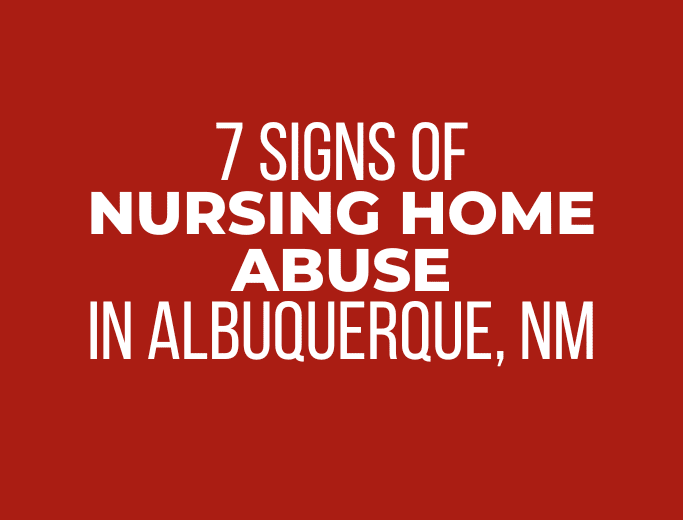Signs of Nursing Home Abuse: 7 Common Indicators

Moving an aging family member to a nursing facility is tough. Albuquerque families choose this option for necessary care, but distance can cause worry for their safety and well-being. Unfortunately, fears are sometimes well substantiated—especially in Albuquerque. According to a 2019 report, New Mexico’s nursing homes have been ranked as the second-lowest for quality of care and the fifth-highest in the number of deficiencies per facility across the country. In some cases, such flaws may be so serious that they may qualify as nursing home elder abuse.
At Ron Bell Injury Lawyers, our nursing home abuse lawyers care deeply about the aging members of our community. We urge our readers to be aware of common signs that their loved one may not be receiving the level of care they should be. Some signs of abuse in nursing home residents, such as bruises and broken bones, are obvious. Others, however, are not. An untrained eye might even overlook them entirely.
What Is Elder Abuse?
The World Health Organization (WHO) defines elder abuse as “a single or repeated act, or lack of appropriate action, occurring within any relationship where there is an expectation of trust, which causes harm or distress to an older person.”
In line with this definition, the following actions may constitute elder abuse in the context of nursing homes:
- Neglect, which can range from leaving the resident unattended for an extended period to failing to provide the necessities, including food, water, and medicine
- Physical abuse, such as pushing, hitting, slapping, or even restraining the resident
- Emotional abuse, including verbal and psychological abuse
- Sexual abuse
- Financial abuse
Unfortunately, these types of abuse in older adults are more prevalent in nursing home facilities than we know. So, how do you know if an elderly person you care about is suffering from physical harm or other forms of abuse? Here are seven red flags to look for.
Nursing Home Abuse Warning Signs
Elder abuse in Albuquerque nursing homes and long-term care facilities is a silent, underreported problem that affects thousands of aging Americans each year. If you notice any of these common signs of elder neglect or nursing home abuse, there may be a problem.
As a caregiver, you must act decisively to protect your elderly loved one who may not be able to advocate for themselves.
- Speak with nursing home staff members about your concerns.
- Also, report any suspected abuse to the New Mexico Adult Protective Services at 1-866-654-3219
- Finally, make sure to contact the nursing home abuse lawyers at Ron Bell Injury Lawyers as soon as possible.
Bedsores
One of the tell-tale signs of nursing home abuse or neglect is the presence of bed sores, also known as pressure ulcers. These wounds are caused by prolonged pressure in one area of the body and are called “bed sores” because they generally result from being confined to a bed for extended periods of time. Bed sores can be prevented with proper care, so if you notice one on an elderly family member, be aware that this may be a sign of neglect.
Weight Loss and Malnutrition
While some amount of weight loss is common to the aging process, rapid or sudden weight loss could be a sign that your loved one isn’t getting adequate nutrition. This is a fairly common problem in nursing homes. It may be due to understaffing, with too few nursing assistants overseeing the nutritional needs of many residents. Another cause could be inadequate training of staff members.
Signs of malnutrition include:
- weight loss
- mouth sores
- yellowish or dull skin
- cognitive problems
Dirty Rooms and Common Areas
Even if your loved one does not yet demonstrate any worrisome physical or emotional changes, the poor state of rooms, living spaces, and/or shared areas may indicate that the facility is struggling to provide an adequate level of care. This situation can quickly escalate into neglect.
This doesn’t refer to a cluttered, untidy, or disorganized space, of course. Clothes piled on a chair aren’t necessarily an indication of nursing home neglect. Unsanitary living conditions, however, are unacceptable. Nursing homes are supposed to be clean environments that prevent the spread of illness.
Be alert to issues like foul smells, dirty bathrooms, stained bed sheets, visible traces of old food scattered around the room or lying on a tray, and similar signs indicating substandard, unsanitary conditions. You shouldn’t be afraid to speak up about such conditions to the facility’s staff and management. At the same time, you should be prepared to take more decisive action if you notice the problem every time you visit.
Severe, Repeated, or Unexplained Injuries
You should be concerned if you notice visible injuries on the person’s body, especially if he or she doesn’t want to talk about what has occurred or if the explanation they give is incoherent. Injuries may be a sign of either physical violence or extreme neglect.
Some common nursing home injuries that may be caused by or related to abuse include:
- Strange, unexplained bruising or scars
- Unusual weight loss that can’t be ascribed to an underlying medical condition
- Sprained or broken bones
- Repeated physical injuries
Falls
An elderly person should be supervised when moving around in a nursing home to avoid injury. If your loved one suffered a fall in a nursing home while trying to go to the bathroom or get something to eat, then the Albuquerque nursing home’s staff may not be caring for them as well as they should.
Some of the most common serious injuries resulting from falls in nursing homes include:
- Fractures
- Head injuries
- Soft tissue injuries
- Dislocations
- Cuts and abrasions
- Fear and psychological impact
Infections
While infection isn’t always possible to prevent, a nursing home should do its best to create as sterile of an environment as possible. If you notice your family member has recurring infections in a nursing home or illnesses, there may be a problem.
Here is a list of some signs of infection that you might see in residents residing in skilled nursing or assisted living facilities:
- An unexplained rise in body temperature
- Unusual tiredness or weakness
- Persistent pain, discomfort, or soreness
- Sudden confusion, disorientation, or irritability
- Shortness of breath or rapid breathing
- Persistent coughing or wheezing
- Significant decrease or increase in appetite
- Noticeable decrease in urination, dry mouth, or extreme thirst
- Redness, swelling, or pus around wounds or skin lesions
- Nausea, vomiting, diarrhea, or abdominal pain
- Painful or frequent urination or strong-smelling urine
- Rapid or irregular heartbeat
- Sudden loss of strength or energy
- Foul-smelling discharge from wounds, urine, or stool
If you notice any of these symptoms in a nursing home resident you love, it’s crucial to inform the healthcare staff immediately for proper evaluation and treatment.
Sudden Changes in Mood, Personality, or Behavior Patterns
Another common symptom of elder abuse is related to surprising changes in personality and behavior patterns. This may include sudden mood swings that can’t be explained by regular medication or ongoing treatment.
Abuse victims may seem depressed or withdrawn. You may also notice that they’ve lost interest in activities he or she previously enjoyed and have become irritable, angry, or impatient with you or fellow residents. Of course, while personality and behavior changes are not always caused by abuse, they are nevertheless a worrisome sign that should never be ignored.
If You Suspect Abuse or Neglect, Now for Your Free Consultation
If you suspect that your loved one is being abused or neglected at the hands of their nursing home caretakers or other residents, it’s important to speak with an attorney at our law firm as soon as possible.
Time limits called “statutes of limitations” exist, which limit the period in which you can file a claim. After this period has expired, it can be difficult, if not impossible, to get legal help and file a claim for abuse.
Aside from the statute of limitations, cases of nursing home abuse can escalate, and your loved one’s well-being could be in jeopardy. An experienced Albuquerque nursing home abuse attorney from Ron Bell Injury Lawyers can help you take the right steps.
We will ensure that the abuse or neglect at the hands of nursing home staff stops and that your loved one can receive the compensation they deserve.
Call us today at 505-898-2355 to discuss your family member’s situation with a member of our team.
Why Choose Ron Bell Injury Lawyers?
We Get Results!
